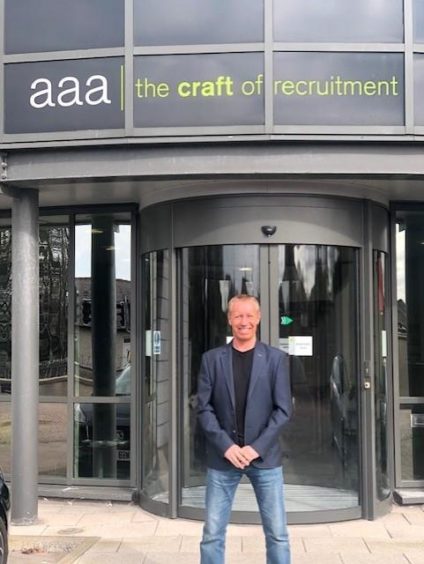Cost-of-living pressures are impacting the north-east job market, according to a recruitment agency boss.
A growing number of people are choosing jobs elsewhere, he said.
Andrew Ferguson, director of accountancy recruitment firm Vero, has seen a “huge amount” of candidates favour a move to Glasgow or Edinburgh, instead of Aberdeen.
He believes the city has “struggled” to do enough to maintain its image and attract people.
And the cost-of-living crisis is now the main factor for many when it comes to accepting or even staying in their current job, he said.
Impossible task for employers
Mr Ferguson, who started Vero in 2019, with partner Becca, added: “I’ve seen people move jobs, despite being happy where they are, because they only got a 2-3% pay increase.
“By changing job they have seen their salary rise by 10-20%.
“Most employers are doing what they can – everyone is mindful of it – but there’s only so much some of them can do.
“Some can’t afford to do anything.
“In general, companies have done as much as they can.
“But I think it’s impossible to give enough to cover the offset of how much everything has gone up in price.
“A lot of companies have done 3-5% which maybe only covers half an increase in a food bill.
“For most people it’s still a struggle.”
Jobseekers favouring move away
Mr Ferguson believes a number of factors have made it difficult for roles to be filled in the north-east.
He said: “There’s the cost-of-living impact and people being much more discerning when looking for a job.
“There’s definitely been a shift of people away from Aberdeen, unfortunately.
The city has struggled to do enough from an image point of view to retain people.”
Andrew Ferguson, Vero director.
“It probably started around 2014-15 during the oil and gas downturn, and Covid has accelerated that.
“I can spend days approaching people and they say it looks like a great job, but only if it’s based in Glasgow, Edinburgh, Bristol or overseas.
“The city has struggled to do enough from an image point of view to retain people.”
AAA Recruitment lead consultant Mark Lints has also seen a knock-on effect.
He said: “The cost-of-living crisis is definitely impacting the north-east job market.
“Companies are having to offer remote working to those outwith the city with relevant skills, but without the desire to move into a high-cost area like Aberdeen, or offer increased salaries to compensate for the increased costs of living.
“Staff retention is also an issue – clients not offering top market rates or pay rises risk losing candidates to competitors.”
Impact on talent pool
Amanda McCulloch, chief executive of Aberdeen-based TMM Recruitment, believes the way the region positions itself as a great place to work and live is “vital”.
She said: “Historically, we have seen people moving away from the north-east, which impacts the talent pool.
“Perhaps we need to consider if the shift to remote working benefits us… and if we are as agile as we could be when accommodating new employees.
“How Aberdeen and the wider north-east positions itself as a great place to live and work is vital.”
Amanda McCulloch, TMM Recruitment chief executive
“Of course, this could change as we pivot to renewables and people take advantage of the huge career opportunities in the energy sector, particularly decommissioning as well as the green and blue economy.
“How Aberdeen and the wider north-east positions itself as a great place to live and work is vital.
“There are so many upsides, but we need to respond to the changing market and be agile in recognising what is important to the current and future workforce.”
Covid continuing to affect market
Ms McCulloch believes the ripple effects of the Covid-19 pandemic continue to have an impact on recruitment.
She added: “The availability of candidates who meet the requirements of employers continues to be a challenge.
“Companies often have a clear view on what they want and need, but are sometimes less willing to compromise or support training.
“Gradually this is changing, but it’s likely a hangover from companies not upskilling or providing training through the downturn and pandemic.
“Niche skills are in demand but for some roles there just aren’t enough candidates in the job market.”
This is compounded by graduates not having the chance to experience a work placement due to lockdown restrictions, and people moving or switching to other sectors, she said, adding: “Negotiating salaries and contractor rates have also been an issue in a post-Covid world, combined with the pressures of the IR35 tax legislation.”



Conversation